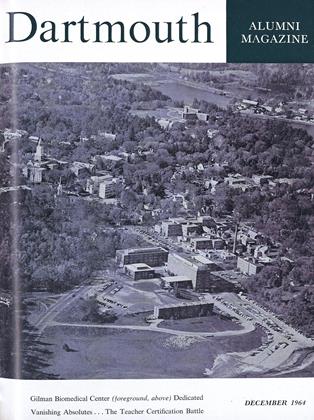By Ellis O. Briggs '21. New York: David McKay Co., Inc., 1964. 306 pp. $4.95.
Thirty-seven years in the American Foreign Service, spanning a period (1925-1962) of revolutionary political, ecenomic, technological, and social changes on a worldwide scale, with globe-covering posts in the American republics, Africa, Europe, and Far and Near East, topped off by eight Ambassadorships, sum up the long and distinguished career of Ellis Briggs. These are impressive credentials for the authorship of an interesting book. Such is Farewell toFoggy Bottom in which Ambassador Briggs records his recollections as a career diplomat.
Written in a refreshingly blunt, graphic and lively style, this book is never dull. With good humor, the author pokes fun at himself, as well as at other colleagues as they have their fling on the diplomatic stage.
The Ambassador devotes the greater part of his recollections, some tragic, some comical, to personal experiences, anecdotes, and events at various posts. Through these various episodes there runs a central theme, that of a man who is disturbed about some aspects of past and present foreign policy, who is devoted to the Foreign Service in which he spent the 37 best years of his life, who believes the Service is following the wrong road in several respects, and who bluntly proposes corrective measures, letting the chips fall where they may.
This theme constitutes the real substance and importance of the book. In developing it Ambassador Briggs treads heavily on many toes, he minces no words, and he goes in with both fists flying. He takes a dim view, for example, of the Alliance for Progress and Foreign Aid, is skeptical about the Peace Corps, belabors what he considers overstaffing in the Department of State and its Foreign Service establishments, criticizes the proliferation of representatives of other Government departments and agencies abroad, too rapid transfers of Ambassadors, the appointment of unqualified non-career Ambassadors, too much foreign traveling by special representatives and high Government officials leading to the undermining of the prestige and usefulness of the Ambassador at his post, and other matters of varying importance.
Most knowledgeable persons in and out of Government will agree with Ambassador Briggs on some, perhaps several, points, and will have open minds on the rest. Yet it Is difficult to escape the feeling that sledge-hammer tactics are hardly those best calculated to move sluggish bureaucracy and vested interests, no matter how worthy the goal. In Washington, where the corrective decisions would have to be made, there are usually several sides to any question. The facts of life would suggest that a more objective approach, and less picturesque language, might accomplish greater results.
Farewell to Foggy Bottom will be of considerable interest to those in the Foreign Service, as well as to those outside the profession who keep up with foreign affairs generally. It will also be worthwhile reading for the infinitely larger group of people who are interested in foreign countries, places, and peoples.
Ambassador of the United Statesof America, Retired
 View Full Issue
View Full Issue
More From This Issue
-
 Feature
FeatureVANISHING ABSOLUTES
December 1964 -
 Feature
FeatureOur Battle To Reform The Education of Teachers
December 1964 By THOMAS W. BRADEN '40 -
 Feature
FeaturePRESIDENT'S POLLSTER
December 1964 By CLIFFORD L. JORDAN '45 -
 Feature
FeatureTwin Pillar of Alumni Support
December 1964 By FORD H. WHELDEN '25 -
 Feature
FeatureGilman Biomedical Centedicated
December 1964 -
 Article
ArticleNine John Ledyards, Modern Style
December 1964 By BOB WILDAU '65
Books
-
 Books
BooksTUCK SCHOOL PUBLISHES "MANUAL ON RESEARCH AND REPORTS"
MARCH 1931 -
 Books
BooksAlumni Articles
January 1956 -
 Books
BooksAN ACCOUNT OF CALLIGRAPHY PRINTING IN THE SIXTEENTH CENTURY
March 1940 By Albert I. Dickerson '30 -
 Books
BooksMount St. Helens at al
MARCH 1982 By Bliss K. Thorne '38 -
 Books
BooksGRAY MATTERS, A NOVEL.
FEBRUARY 1972 By ROBERT H. ROSS '38 -
 Books
BooksLINEAR SYSTEMS IN COMMUNICATION AND CONTROL.
JUNE 1972 By THOMAS F. PIATKOWSKI


